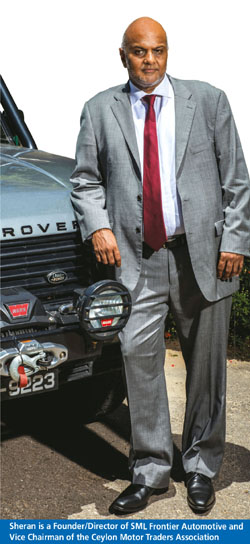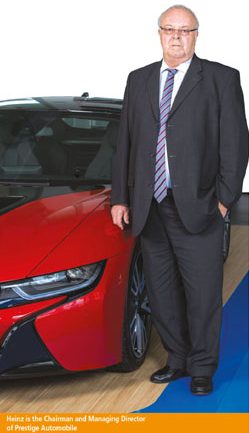MOTOR INDUSTRY
SHORT TAKES
Compiled by Savithri Rodrigo

Q: How are measures to tighten credit impacting the motor industry?
Sheran Fernando (SF): This has a major impact on the industry especially at the lower end. While the government doesn’t address the need for inadequate public transport, this policy makes it difficult for a citizen to buy a car.
Heinz Reuter (HR): The tightening of the credit policy on motorcars has impacted smaller and medium-size cars. Those who are most affected by the reduction in the loan to value (LTV) ratio – from 90 percent to 70 percent; and now 50 percent – are middle income earners and young executives who find it challenging to finance a new car.
Q: Are you in favour of moves to assemble vehicles with used spare part imports?
SF There is no such thing as ‘assembling vehicles with used spare parts.’ This is purely duty circumvention and circumventing the prevailing law, which states that vehicles over three years old cannot be imported to Sri Lanka. Duty on vehicles is over 150 percent; and duty on spare parts is less than 50 percent. The fact that parts over 10 years old are imported and used to assemble vehicles with the approval of the government is incomprehensible as safety must be of utmost concern.
HR Assembling cars with used parts is an extremely dangerous undertaking, endangering not only users but also the general public as safety standards aren’t maintained. I don’t know of any other country where this practice is allowed.
Q: Which source markets are proving to be the most successful when it comes to vehicle imports?
SF Presently, India accounts for over 90 percent of Sri Lanka’s vehicle imports but this is only due to current imports being ICE vehicles. All major research on transport trends indicate that the future is electric, which could impact India’s stronghold as China is a major manufacturer of electric batteries for electric vehicles (EVs).
HR Currently, the highest number of cars imported to Sri Lanka is from India, Japan and South Korea.
Q: Has there been a satisfactory uptick in demand for EVs?
SF Demand grew strongly until the government increased duty and curtailed growth. Sri Lanka is extremely conducive to EVs as travelling distances are short and this sits well with the EV range. Policy support can raise demand substantially
HR The massive increase in duty on EVs saw imports fall drastically. This is a pity because in many countries especially in Europe governments are reducing duty and taxation while introducing other incentives to encourage the use of EVs.
Q: Are you witnessing greater demand for smaller vehicles especially given the congestion in urban centres?
SF Motorbikes, three wheelers and sub 1,000cc vehicles such as Marutis comprise 90 percent of vehicle registrations. According to a survey, this paradigm is needs driven due to limited public transport and consumers using three wheelers.
HR There is greater demand for smaller vehicles. It’s not a case of congestion but rather cost that’s the primary issue.
Q: How are traditional vehicle sales faring with the availability of more eco-friendly options?
SF Vehicle sales are a function of duty – or the ability to circumvent it. Import duty on a small car exceeds 150 percent, and at three times the cost, insurance and freight (CIF) cost. If the government reduces the duty on EVs, it would lead to wider adoption of cleaner energy vehicles. The state should also consider a policy framework that incentivises zero emission vehicles through duty, road tax, and even parking charges and zones.
HR It is regrettable that the increase in duty has led to a decline in EV and eco-friendly car sales. Sri Lanka is an ideal location to introduce vehicles charged with solar power as well. Another advantage is that EVs involve hardly any service costs with no filter or oil changes, or mechanical repairs, being necessary.
Q: How are larger establishments performing in the face of smaller entities importing secondhand vehicles?
SF Smaller entities purchase and import vehicles from retail channels, generally buying them at a higher price than what an agent offers. However, with the present policy not being transparent nor facilitating a level playing field, duty calculations give them a considerable advantage – this makes them competitive.
HR The import of used cars and so-called ‘used cars’ is a major concern for all vehicle importers. Sri Lanka is one of the few countries that permit the import of used cars. Another concern is the increasing trend in parallel imports of luxury vehicles and brand-new cars from countries such as the UK, which are not specifically manufactured for the Sri Lankan market. The present duty system is misused as highlighted by recent representations made by the Ceylon Motor Traders Association (CMTA).

Q: Do you see more consistency in government fiscal policy towards the motor industry?
SF We have had a series of discussions with the minister and officials of the Ministry of Finance, and hope that policy recommendations aimed at greater transparency will even out the playing field.
HR Fiscal policy has been inconsistent, which makes it difficult to engage in medium or long-term planning.
Q: What key amendments would be required in the import duty structure?
SF The current account deficit and balance of payments situation require revenue, and Sri Lanka addresses this by imposing high customs and import duty to limit forex expenditure. However, some importers pay less than others when this paradigm exists because the structure is based on vehicle valuations. Duty should be levied on the basis of transparent criteria including engine size, power output and emission levels.
HR The present valuation system used by customs doesn’t guarantee a level playing field. The term ‘used car’ must also be redefined as brand-new cars registered for a few days are imported as used cars that enjoy a 15 percent value depreciation on duty. Duties and taxes for EVs too should be revised, and incentives offered to customers to purchase these vehicles.
Q: What are the technological advancements to look out for in the motor industry?
SF Electric zero emission vehicles, driverless cars and non-owned usage models.
HR Electric cars and hybrids. Some European countries – with France leading the way and Scandinavia following suit – will permit only electric cars in the near future. They will ban vehicles that do not conform to EU6 standards from city centres.



